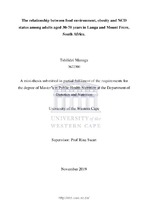| dc.contributor.advisor | Swart, Rina | |
| dc.contributor.author | Manuga, Tshilidzi | |
| dc.date.accessioned | 2020-12-02T11:32:12Z | |
| dc.date.available | 2020-12-02T11:32:12Z | |
| dc.date.issued | 2019 | |
| dc.identifier.uri | http://hdl.handle.net/11394/7637 | |
| dc.description | Master of Public Health - MPH | en_US |
| dc.description.abstract | Non-Communicable Diseases (NCDs) are some of the leading causes of death
worldwide. Obesity results from the interactions between biology, behaviour, and
environment. The current obesity epidemic is largely driven by environmental rather than
biological factors, through its influence on social norms regarding food choices and lifestyle
behaviours. The number of people dying from diabetes and hypertension keeps increasing
because of the current obesity trend. | en_US |
| dc.language.iso | en | en_US |
| dc.publisher | University of Western Cape | en_US |
| dc.subject | Non-communicable diseases | en_US |
| dc.subject | Obesity | en_US |
| dc.subject | Food environments | en_US |
| dc.subject | Adults | en_US |
| dc.subject | Diabetes | en_US |
| dc.title | The relationship between food environment, obesity and NCD status among adults aged 30-70 years in Langa and Mount Frere, South Africa. | en_US |
| dc.rights.holder | University of Western Cape | en_US |

